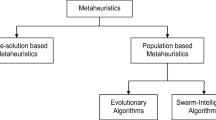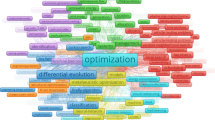Abstract
Almost all evolutionary algorithms suffer from the problem of premature convergence and stagnation in local optima. An approach based on an evolutionary algorithm is presented in this work with different mutation schemes to address these issues. The mutation process used is an adaptive one which utilizes fitness variance and space aggregation concept. The mutation used in the technique is wavelet mutation, Levy flight, particle swarm optimization-based mutation, Chaotic, and non-uniform mutation. Levy flight is a random walk process which determines the step size based on Levy distribution, whereas chaotic and non-uniform mutation is based on logistic map and Gaussian distribution, respectively. In the wavelet mutation, Morlet wavelet is used as a mutation operator. The experimentation is carried out with each mutation strategy, and the results are obtained in terms of standard deviation and average. Also, the effectiveness of the proposed work is tested by performing a statistical analysis named Wilcoxon’s rank-sum test. The results from each mutation are compared with each other, and the results from the best mutation method are further compared with other optimization techniques. Moreover, the best strategy, i.e. DDMPEA with the chaotic mutation, is applied to the area coverage optimization problem of WSN.


























Similar content being viewed by others
Data availability
The input dataset is publicly available, and detailed output data are given in the manuscript.
References
Ali MZ, Awad NH, Suganthan PN, Shatnawi AM, Reynolds RG (2018) An improved class of real-coded Genetic Algorithms for numerical optimization✰. Neurocomputing 275:155–166. https://doi.org/10.1016/j.neucom.2017.05.054
Arumugam MS, Rao MVC, Palaniappan R (2005) New hybrid genetic operators for real coded genetic algorithm to compute optimal control of a class of hybrid systems. Appl Soft Comput J 6(1):38–52. https://doi.org/10.1016/j.asoc.2004.11.001
Assarzadeh Z, Naghsh-Nilchi AR (2015) Chaotic particle swarm optimization with mutation for classification. J Med Signals Sens 5(1):12
Chauhan S, Vashishtha G (2023) A synergy of an evolutionary algorithm with slime mould algorithm through series and parallel construction for improving global optimization and conventional design problem. Eng Appl Artif Intell 118:105650. https://doi.org/10.1016/j.engappai.2022.105650
Chauhan S, Singh M, Aggarwal AK (2019) Crisscross optimization algorithm for the designing of quadrature mirror filter bank. In: International conference on intelilgent communication and computational techniques, pp 124–130.
Chauhan S, Singh M, Aggarwal AK (2020) Diversity driven multi-parent evolutionary algorithm with adaptive non-uniform mutation. J Exp Theor Artif Intell 2020:1–32
Chauhan S, Singh M, Aggarwal AK (2021) Cluster head selection in heterogeneous wireless sensor network using a new evolutionary algorithm. Wireless Pers Commun 119(1):585–616
Chauhan S, Vashishtha G, Kumar A (2022a) A symbiosis of arithmetic optimizer with slime mould algorithm for improving global optimization and conventional design problem. J Supercomput 78(5):6234–6274. https://doi.org/10.1007/s11227-021-04105-8
Chauhan S, Vashishtha G, Kumar A, Abualigah L (2022b) Conglomeration of reptile search algorithm and differential evolution algorithm for optimal designing of fir filter. Circuits Syst Signal Process. https://doi.org/10.1007/s00034-022-02255-5
Chauhan S, Vashishtha G, Kumar A (2022c) Approximating parameters of photovoltaic models using an amended reptile search algorithm. J Ambient Intell Humaniz Comput. https://doi.org/10.1007/s12652-022-04412-9
Commuri S, Watfa MK (2006) Coverage strategies in wireless sensor networks. Int J Distrib Sens Networks 2(2006):333–353. https://doi.org/10.1080/15501320600719151
Dorigo M, Birattari M (2006) Ant colony optimization. IEEE Comput Intell Mag 1(4):28–39
Eberhart R, Kennedy J (1995) A new optimizer using particle swarm theory.In: Proceedings of Sixth international symposium on micro machine and human science, Piscataway. IEEE, pp. 39–43, doi: https://doi.org/10.1109/mhs.1995.494215.
García-Martínez C, Lozano M, Herrera F, Molina D, Sánchez AM (2008) Global and local real-coded genetic algorithms based on parent-centric crossover operators. Eur J Oper Res 185(3):1088–1113. https://doi.org/10.1016/j.ejor.2006.06.043
Gupta S, Deep K, Mirjalili S, Kim JH (2020) a modified sine cosine algorithm with novel transition parameter and mutation operator for global optimization. Expert Syst Appl 154:113395
Hassanzadeh HR, Rouhani M. (2010) A multi-objective gravitational search algorithm. In 2010 2nd international conference on computational intelligence, communication systems and networks, CICSyN 2010, vol 1, pp 7–12, doi: https://doi.org/10.1109/CICSyN.2010.32.
Heidari AA, Mirjalili S, Faris H, Aljarah I, Mafarja M, Chen H (2019) Harris hawks optimization: algorithm and applications. Futur Gener Comput Syst. https://doi.org/10.1016/j.future.2019.02.028
Jensi R, WiselinJiji G (2016) An enhanced particle swarm optimization with Levy flight for global optimization. Appl Soft Comput 43:248–261. https://doi.org/10.1016/j.asoc.2016.02.018
Kaur G, Arora S (2018) Chaotic whale optimization algorithm. J Comput Des Eng 5(3):275–284. https://doi.org/10.1016/j.jcde.2017.12.006
Kumar M, Kulkarni AJ, Chandra S (2018) Socio evolution & learning optimization algorithm: a socio-inspired optimization methodology. Futur Gener Comput Syst 81(2018):252–272. https://doi.org/10.1016/j.future.2017.10.052
Li S, Chen H, Wang M, Heidari AA, Mirjalili S (2020) Slime mould algorithm : a new method for stochastic optimization. Futur Gener Comput Syst 111:300–323. https://doi.org/10.1016/j.future.2020.03.055Slime
Ling SH, LuChan HHCKY, Lam HK, Yeung BCW, Leung FH (2008) Hybrid particle swarm optimization with wavelet mutation and its industrial applications. IEEE Trans Syst Man Cybern Part B 38(3):743–763
Mafarja MM, Mirjalili S (2017) Hybrid whale optimization algorithm with simulated annealing for feature selection. Neurocomputing 260:302–312. https://doi.org/10.1016/j.neucom.2017.04.053
Meng A, Chen Y, Yin H, Chen S (2014) Crisscross optimization algorithm and its application. Knowl-Based Syst 67:218–229. https://doi.org/10.1016/j.knosys.2014.05.004
Miao Z, Yuan X, Zhou F, Qiu X, Song Y, Chen K (2020) Grey wolf optimizer with an enhanced hierarchy and its application to the wireless sensor network coverage optimization problem. Appl Soft Comput J 96:106602. https://doi.org/10.1016/j.asoc.2020.106602
Mirjalili S (2015) The ant lion optimizer. Adv Eng Softw 83:80–98. https://doi.org/10.1016/j.advengsoft.2015.01.010
Mirjalili S (2016) SCA: a sine cosine algorithm for solving optimization problems. Knowledge-Based Syst 96:120–133. https://doi.org/10.1016/j.knosys.2015.12.022
Mirjalili S, Gandomi AH (2017) Chaotic gravitational constants for the gravitational search algorithm. Appl Soft Comput 53(2017):407–419. https://doi.org/10.1016/j.asoc.2017.01.008
Mirjalili S, Lewis A (2016) The whale optimization algorithm. Adv Eng Softw 95:51–67. https://doi.org/10.1016/j.advengsoft.2016.01.008
Mirjalili S, Mirjalili SM, Lewis A (2014) Grey wolf optimizer. Adv Eng Softw 69:46–61. https://doi.org/10.1016/j.advengsoft.2013.12.007
Mirjalili S, Mirjalili SM, Hatamlou A (2016) Multi-verse optimizer: a nature-inspired algorithm for global optimization. Neural Comput Appl 27(2):495–513. https://doi.org/10.1007/s00521-015-1870-7
Mirjalili S, Gandomi AH, Zahra S, Saremi S (2017) Salp swarm algorithm : a bio-inspired optimizer for engineering design problems. Adv Eng Softw 114:163–191. https://doi.org/10.1016/j.advengsoft.2017.07.002
Rao RV, Savsani VJ, Vakharia DP (2011) Teaching-learning-based optimization : a novel method for constrained mechanical design optimization problems. Comput Des 43(3):303–315. https://doi.org/10.1016/j.cad.2010.12.015
Saremi S, Mirjalili S, Lewis A (2017) Grasshopper optimisation algorithm: theory and application. Adv Eng Softw 105:30–47. https://doi.org/10.1016/j.advengsoft.2017.01.004
Shivaligegowda C, Jayshree PVY (2020) Hybrid gravitational search algorithm based model for optimizing coverage and connectivity in wireless sensor networks. J Ambient Intell Humaniz Comput. https://doi.org/10.1007/s12652-020-02442-9
Simon D (2008) Biogeography-based optimization. IEEE Trans Evol Comput 12(6):702–713. https://doi.org/10.1109/TEVC.2008.919004
Vashishtha G, Kumar R (2021a) An effective health indicator for Pelton wheel using Levy Flight mutated genetic algorithm. Meas Sci Technol 32(9):094003
Vashishtha G, Kumar R (2022b) An amended grey wolf optimization with mutation strategy to diagnose bucket defects in Pelton wheel. Measurement 187:110272. https://doi.org/10.1016/j.measurement.2021.110272
Vashishtha G, Kumar R (2021c) Centrifugal pump impeller defect identification by the improved adaptive variational mode decomposition through vibration signals. Eng Res Express 3(3):035041
Vashishtha G, Kumar R (2023) feature selection based on gaussian ant lion optimizer for fault identification in centrifugal Pump. In: Gupta VK, Amarnath C, Tandon P, Ansari MZ (eds) Recent advances in machines and mechanisms. Springer Nature, Singapore, pp 295–310
Vashishtha G, Chauhan S, Kumar A, Kumar R (2022) An ameliorated African vulture optimization algorithm to diagnose the rolling bearing defects. Meas Sci Technol 33(7):075013. https://doi.org/10.1088/1361-6501/ac656a
Yang X-S (2010) Firefly algorithm, stochastic test functions and design optimisation. Int J Bio-Inspired Comput 2(2):1–12
Yu X, Chen W, Zhang X (2007) An artificial bee colony algorithm for solving constrained optimization problems. Found Fuzzy Log Soft Comput. https://doi.org/10.1109/IMCEC.2018.8469371
Zhu C, Zheng C, Shu L, Han G (2012) A survey on coverage and connectivity issues in wireless sensor networks. J Netw Comput Appl 35(2):619–632. https://doi.org/10.1016/j.jnca.2011.11.016
Funding
The authors have not disclosed any funding.
Author information
Authors and Affiliations
Contributions
SC contributed to the data curation, visualization, investigation, and writing—original draft. MS was involved in writing—review and editing and supervision. AKA assisted in writing—review and editing and supervision.
Corresponding author
Ethics declarations
Conflict of interest
The author declare that they have no conflict of interest.
Ethical standard
This article does not contain any studies with human participants or animals performed by any of the authors.
Additional information
Publisher's Note
Springer Nature remains neutral with regard to jurisdictional claims in published maps and institutional affiliations.
Rights and permissions
Springer Nature or its licensor (e.g. a society or other partner) holds exclusive rights to this article under a publishing agreement with the author(s) or other rightsholder(s); author self-archiving of the accepted manuscript version of this article is solely governed by the terms of such publishing agreement and applicable law.
About this article
Cite this article
Chauhan, S., Singh, M. & Aggarwal, A.K. Investigative analysis of different mutation on diversity-driven multi-parent evolutionary algorithm and its application in area coverage optimization of WSN. Soft Comput 27, 9565–9591 (2023). https://doi.org/10.1007/s00500-023-08090-3
Accepted:
Published:
Issue Date:
DOI: https://doi.org/10.1007/s00500-023-08090-3




